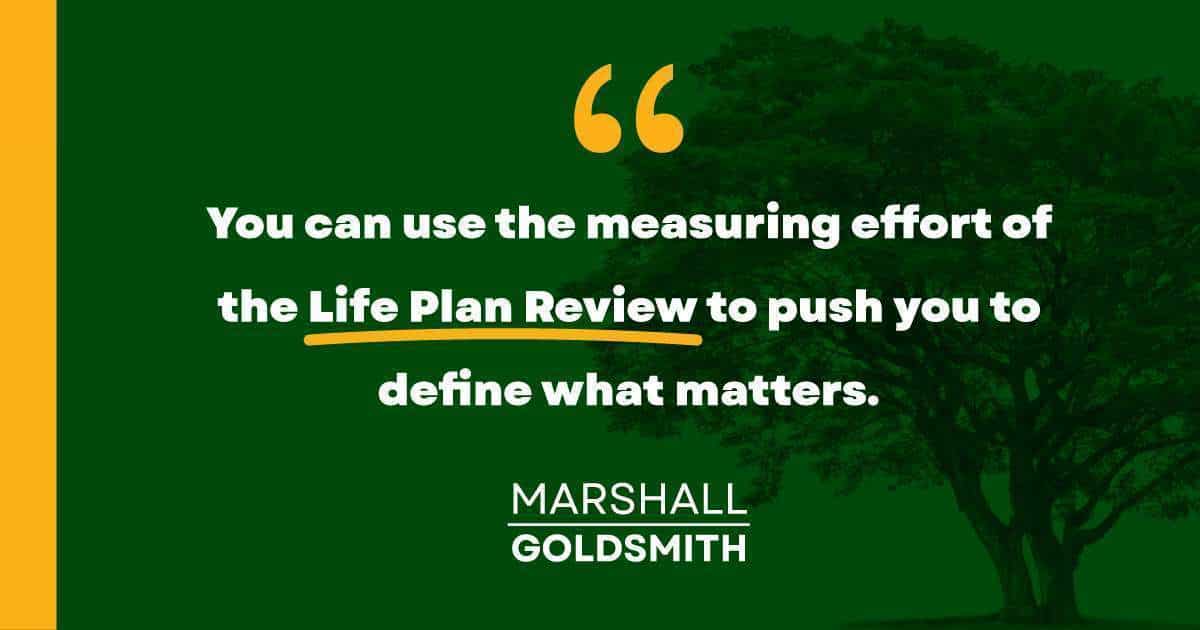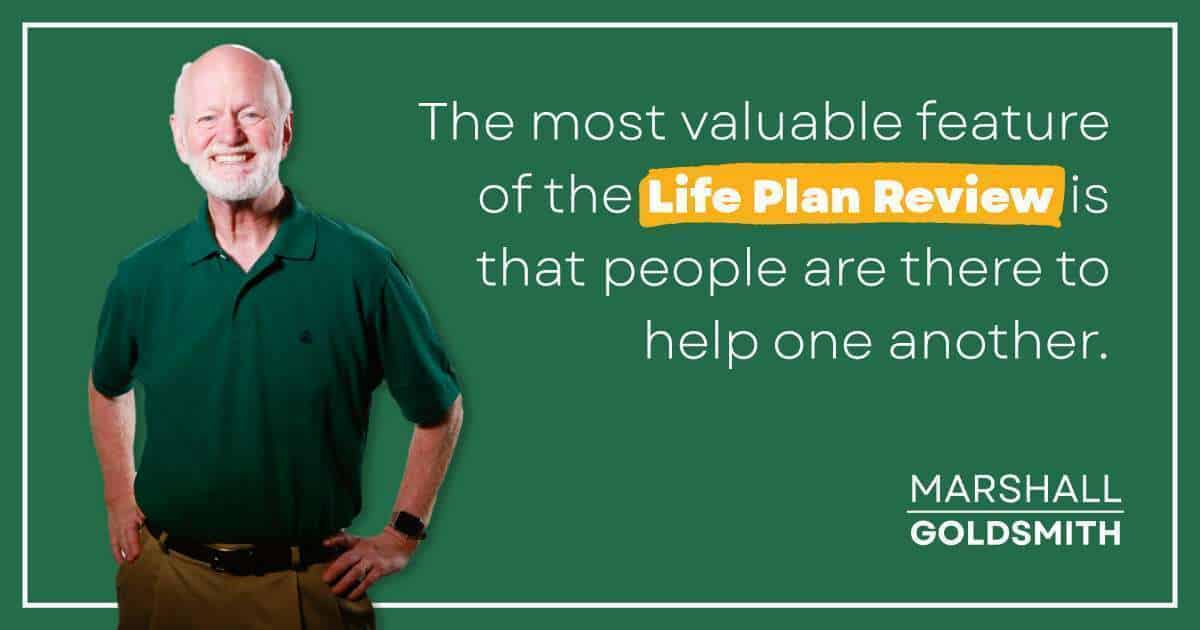Playing Favorites By Marshall Goldsmith There’s a reason I devote...
Although I created the Life Plan Review (LPR) to close the gap between what you plan to do in your life and what you actually get done, it can serve you in additional ways.
The LPR consists of four steps — weekly meetings where you answer fixed questions with a partner to improve your life; self-monitoring between weekly meetings, a weekly plan review based on its relevance and your personal need, and the importance of not doing it alone.
When using the LPR, you will notice it provides other benefits. These include helping you define what matters, and making the rigid structure of the LPR work for you.
You can use the measuring effort of the LPR to push you to define what matters. The LPR consists of four steps — weekly meetings to answer a fixed set of six questions to improve your life; self-monitoring by tracking the questions daily; a weekly plan to determine relevance and personal needs; and an insistence on not doing it alone.
When Garry Ridge, the longtime CEO of WD-40 (yes, the blue and yellow can with the red top that’s in everyone’s home) reported his weekly scores in our LPR group, he always stalled on, “Did I do my best to find meaning?”
For six consecutive weeks, he’d write down a neutral 5, explaining that he was struggling to define his criteria for “meaning.” It’s important to know this fact about Garry: He went back to school and earned a master’s degree in leadership after he became CEO of WD-40, which is like an actor enrolling in acting classes after winning an Academy Award. He is a seeker who takes the practice of management seriously, and he’s constantly learning.
The LPR played directly into this side of Garry Ridge. He was determined to nail down his definition of “finding meaning.” After six weeks of hearing group members describe their criteria for meaning and scratching to find his own definition, Garry showed up with the answer on week 7: “I find meaning,” he said, “when the result of what I’m doing matters to me and helps others.” This might not be an earth-shattering insight to you, but it was to Garry.
This wasn’t an isolated incident. When Theresa Park, a New York literary agent turned film producer, told the group that happiness to her wasn’t necessarily “a feeling of giddiness,” I could see everyone nodding, treating it as an epiphany that immediately redefined happiness for them. Likewise, when Nankhonde van den Broek, calling from Zambia, talked about her primary goal as a new leader of an organization: “I want to observe the tornado without contributing to it,” she said. The managers in the group applauded that insight, as if they could put it to immediate use.

This is what happens in the LPR: Insights and clarity sneak up on you, because (a) every day you have to measure your effort on dealing with meaningful issues, and (b) at week’s end you’re exposed to smart people discussing those issues. All you have to do is show up and catch the nuggets as they fall from everyone’s lips.
By the way, I owe the insight about the value of measuring effort rather than results to my daughter Kelly Goldsmith, who taught me the difference between asking “active” and “passive” questions. “Do you have clear goals?” is passive. “Did you do your best to set clear goals?” is active, because it places the burden on you rather than your situation.
You can also use the rigid structure of the LPR work for you.
The rules of an LPR are few, but they are strict—show up every week, be nice, report your scores. But even with the most rigid structures, you can always find room to improvise within the lines. After a few weeks of sessions, I introduced two questions for each participant to wrap up the meeting: What did you learn this week? and What are you proud of this week? I wasn’t trying to provoke anyone; I was just curious. It became a permanent feature of our sessions.
Another time, when I saw a new member visibly in emotional pain (2020 was a rough year for many people), I called an audible. I asked each member to give the newbie one piece of advice that would help him (an example of feedforward). The session went 30 minutes longer than usual, but I believe he was profoundly touched by everyone’s concern and generosity. The following week, he was a changed man.
The most valuable feature of the LPR is that people are there to help one another.
If you spot an opportunity during the meeting to make someone’s life a little better, seize it.
Improvise. Fool around with the format. Call your audible.
(And let me know about it. You’ll be helping me, too.)

Adding Too Much Value Won’t Get You There By Marshall...
C-Suite Master Class: No, But, However By Marshall Goldsmith Continuing...
The Doerr Institute: Expanding the Market for Coaches By Marshall...
Making Leadership Development Part of the College Degree at Rice...
Sanyin Siang – Winner of the Thinkers50 Marshall Goldsmith Coaching...
Thinkers50 Marshall Goldsmith Distinguished Achievement Award in Coaching – Nominees...
Leading with Influence: What Is Influence360°? By Marshall Goldsmith Founder...
Are You a Dominator, Manipulator, Persuader or Influencer? By Marshall...
Leading with Influence: Redefining Modern Influence Part 2 By Marshall...
My mission is simple. I want to help successful people achieve positive, lasting change and behavior; for themselves, their people, and their teams. I want to help you make your life a little better. With four decades of experience helping top CEOs and executives overcome limiting beliefs and behaviors to achieve greater success, I don’t do this for fame and accolades. I do this because I love helping people!
As an executive educator and coach, I help people understand how our beliefs and the environments we operate in can trigger negative behaviors. Through simple and practical advice, I help people achieve and sustain positive behavioral change.